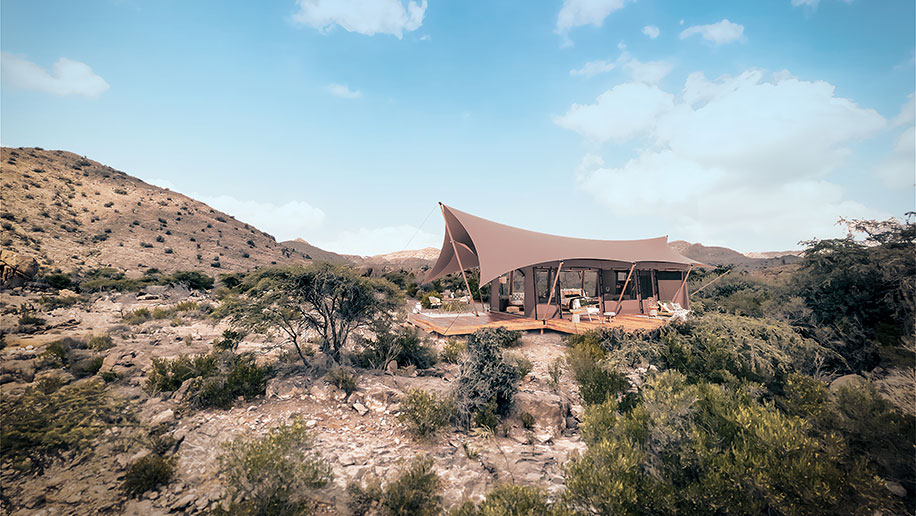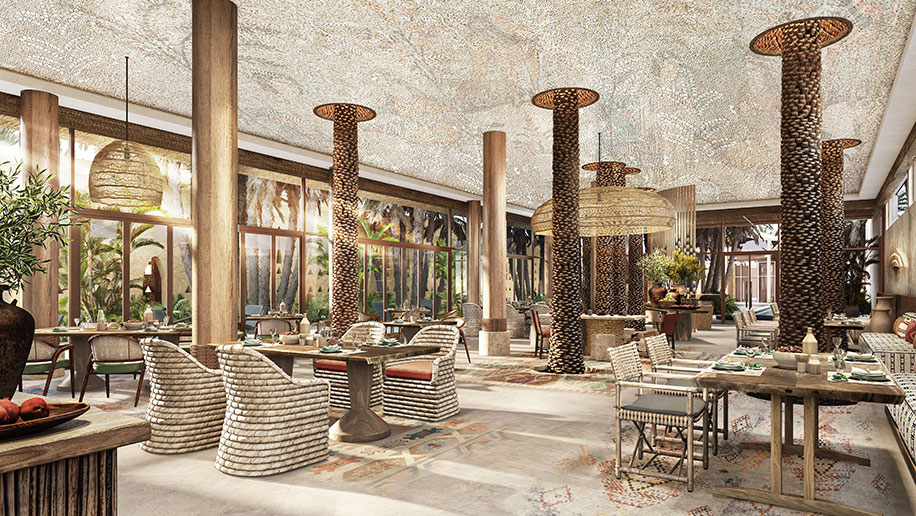
Nöelle Homsy, an architect by training, would often find herself at a construction site surrounded by 400 workers, while directing the design of a building and overseeing its every last detail. She gradually moved into a more management-focused role within the construction industry and ended up working for a hospitality operator in Dubai within its development team.
At the time that the pandemic struck, while she was still working within that team, it allowed her time to pause and reflect on the future of experiential hospitality. It led her to fall back on her own experiences of experiential hospitality from a few years prior. “Right after my MBA gap year in 2017, I was based in Singapore and travelled a lot around South East Asia. I stayed at a few very nice eco-lodges in South East Asia. That is when I realised there’s a side of tourism that we actually don’t know or we’re not used to growing up in the Middle East. We’re used to the glitz and glamour of traditionally built hotels. I realised that hotels can be very well integrated with nature and with the local communities playing a huge part in delivering a specific guest experience,” says Homsy.
That realisation, coupled with her experience within the construction and hospitality industry, led to her along with her co-founder Chris Nader launching ENVI Lodges in September 2021. “Chris and I realised that there’s a huge demand in the market from travellers to stay at unique experiential properties that don’t necessarily look like their rooms at home. They want to interact with nature, they understand the benefits of responsible tourism and the impact they have when they travel.

“After Covid began, we started to hear more about sustainable hospitality and regenerative hotels, especially in the Middle East. No brand which was simultaneously global and at the same time maintained the individual identity of each property, focused only on that. The most successful properties around the world are the mom-and-pop shops, individual one-off properties that were built by either locals or an expat who fell in love with the location and decided to create the concept there. But somehow, they fail to replicate that model elsewhere. So, we decided that we need to create an operator company that can easily [replicate that experience] and expand to other continents,” explains Homsy.
ENVI Lodges, with its corporate headquarters in Dubai, came to life by way of a basic PowerPoint presentation. To go from concept to realisation, she and Nader began to speak to around 50 people from diverse backgrounds. “We pitched the idea to people from different industries, not necessarily only those from the hotel and tourism industry, because it’s very important to hear different perspectives to cross-pollinate ideas. You can learn a lot from other industries and apply them to the lodging space.” The initial concept considered how many keys each property should have, outlined the need for it to operate in the luxury space and defined the amenities and prospective locations for the lodges.
ENVI also built an advisory board that included the likes of Hisham Attar, former senior director Investment Division (MENA), senior director Local Partnerships and former SVP Saudi Equities at the Public Investment Fund in Saudi Arabia; Tea Ros, managing director, Strategic Hotel Consulting; and Jonathan Worsley, chairman of Bench Events.
Another vital member of the team, Homsy says, is Paul Jordaan – a former Six Senses and Aman Resorts executive – brought on-board to manage operations, and is someone she describes as the “third pillar” of ENVI alongside her and Nader.
The plan was to begin with the Middle East and then expand beyond that. However, it was Costa Rica where ENVI ended up announcing one of its first projects back in January 2023. “Our initial plan was to start in the Middle East and then move to other parts of the world. But we got opportunities on other continents which we couldn’t say no to. The Costa Rica site is a very beautiful property and it’s opening around 2026 so we have time to gear up to operate there,” says Homsy.
ENVI has partnered with The Islita Developments to operate ENVI The Islita in Punta Islita on the country’s Nicoya Peninsula. With the South American country aiming to have a zero net emissions economy by 2050, ENVI’s decision to open there was further bolstered. Already, approximately half a million species inhabit the country, which is roughly equal to around 5 per cent of the planet’s total number of species, making ecotourism an important part of that country’s future development.
ENVI The Islita will include 31 guest units made from canvas and wood, as well as 26 “low-impact villas” that will be sold to individual owners and then put back in a rental pool that will be managed by ENVI Lodges as part of its inventory.

Following the Costa Rica announcement, ENVI revealed two destinations in Saudi Arabia. The ENVI Al Nakheel in Saudi Arabia’s UNESCO World Heritage-listed Al Ahsa Oasis was announced last June and is being built within a date palm farm. It will include 25 eco-lodging pods configured in one- and two-bedroom options. There will be an arrival pavilion, café, a farm-to-table dining concept, a spa and a swimming pool. Thai-based Fractal Architects, along with interior design firm, Kristina Zanic Consultants, have been relying on a ‘plant-based architecture’ model wherein the designs of the pods are a nod to a date palm’s trunk, leaves and fronds. “The Al Ahsa region is part of the 2030 tourism strategy set by the government.
This is why it was important for us to be there. ENVI Al Nakheel is on a date farm and we’re trying to create an agritourism experience. The designers and architects have marked the palm trees there and designed the pods to go in between them to minimise the movement of these trees,” notes Homsy.
A few weeks later, in August, ENVI revealed another location for an upcoming eco-lodge – ENVI Laguna Bay in King Abdullah Economic City along the kingdom’s Red Sea coast. “The second property that we’re working on in Saudi Arabia is on a beautiful pristine beach, nestled between mangroves. Because the mangroves needs to be preserved, everything there has to be eco-friendly. There will be around 40 pods distributed along this beach with facilities such as the main house and lobby, a reception, a spa, a kids’ club and an Envi Garden to grow fruits and vegetables, and beautiful restaurants sitting directly on the beach,” says Homsy. While ENVI Al Nakheel is slated to open in the second half of this year, ENVI Laguna Bay is scheduled to do so early next year.
Elsewhere in the Middle East, ENVI has outlined plans for two properties in Oman – one being a high-altitude resort, while the other is located along a beach. ENVI partnered with Oman’s Ministry of Defence Pension Fund to announce ENVI Al Jabel Al Akhdar as the sultanate sets itself a target to attract 11.7 million tourists by 2040. This property will have 40 tents designed by South African firm Tenthouse Structure and will include a heating system – necessary when you consider that the location is 2,000 metres above sea level. Down at sea level within Oman, ENVI recently announced ENVI Al Sifah along the shores of Al Sifah, an hour away from the country’s capital Muscat. Here too, ENVI has partnered with Tenthouse to offer 40 sea-view tents with guests enjoying a mix of a wadi and beach experience during their stay. Both Oman properties will be operational next year.
Beyond the Middle East, and apart from Costa Rica, ENVI has announced an expansion into Africa, specifically into Zanzibar. There too it plans to build a beachfront lodge in Paje. Scheduled to open towards the end of this year, it will feature 25 villas with private pools.
While eco-tourism and low carbon impact are central to ENVI Lodges, Homsy chooses a pragmatic approach to the limits to which sustainability can be built into ENVI’s model. “When we created ENVI, we created our overall sustainability standard based on pillars including respecting the land, creating it with a sense of place, sourcing locally, renewable energy, and so on.
“And while Chris and I had big dreams to save the planet, when it eventually came to designing and developing the units, we realised that we could not save the planet. We cannot implement all that we had on paper as the execution of some of it was simply not feasible. We had to be more reasonable when it comes to sustainability and find the balance between what is comfortable for guests, buildable within a specific location, and what is economically sustainable too. We’re dealing with projects on a case-by-case basis,” says Homsy. She adds that technology could play a greater role in the company’s sustainability plans going forward, especially to monitor consumption, identify areas to enhance efficiency, and aid guests in making sustainable choices.
Building eco-lodges in different parts of the world is capital-intensive. Homsy and Nader are therefore in the midst of raising funds. One of the major geographical areas where ENVI Lodges plans to expand next is Europe. “We’re raising funds to plant our flag on the European continent, and plan to develop four lodges around France. We’re raising around €100 million for France together with a partner there. We’re allowing investors who put money in this fund to buy equity in ENVI to fund our next chapter,” says Homsy.
Last month, ENVI announced a deal with Blue Ocean Capital France to build these lodges in France. ENVI indicated that phase two of the cooperation with Blue Ocean Capital France will involve considering developments beyond France into markets including Spain, Greece, Portugal and Italy.

While building eco-lodges isn’t cheap, the return on investment, she says, is relatively quicker as the turnaround time for these projects is typically around 18 months. Add to that the small scale of each of them – typically between 30-50 keys – means that ENVI can keep operating costs down too. “The return on the investment is much higher than other hotels because of the high average daily rates that you can command [with eco-lodges] based on your uniqueness, location, and the experiences you can create.
“We also look for plots that are remote and not suitable for urban development and this is why we get access to cheap land. Sometimes, the owners own the land. At other times, such as in Saudi, they lease it from the municipality or from whichever ministry owns it at very affordable rates.” She is crystal clear that ENVI will operate within the luxury space – though not the ultra-luxury space. Prices therefore will be on the aspirational scale, though not bordering on the unaffordable spectrum of some other hotel brands.
Crucially, each property will integrate the local community into its plans. That would involve engaging these communities to build storytelling experiences for guests, bringing local chefs to experiment with the cuisine, using local hiking guides, or sending guests on sustainable fishing trips with a local fisherman as will be the case in Oman. “All of these little gestures and little infusions of local culture make or break the experience. And this is what I saw succeed during my travels in South East Asia. In some cases, my stay was very simple, close to not being comfortable in terms of amenities or the bed. But I was so happy simply because the experience was delivered by warm locals and that’s what we are trying to replicate, but at the luxury level.”
The litmus test of whether Homsy and Nader have got it right with their hospitality startup will be realised later this year as ENVI’s first set of properties become operational. From now on though, there’s no turning back.












